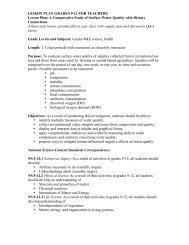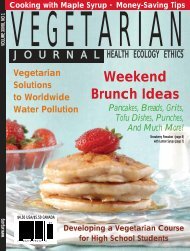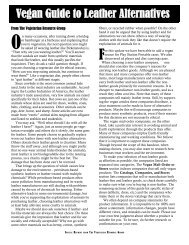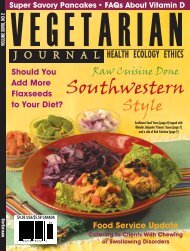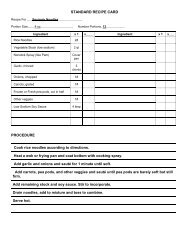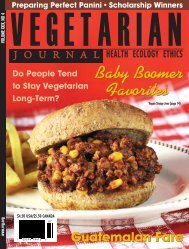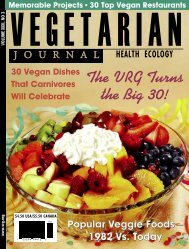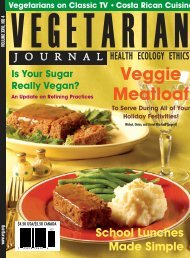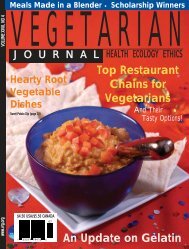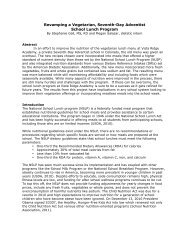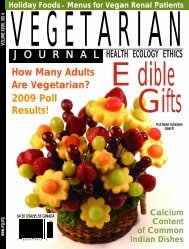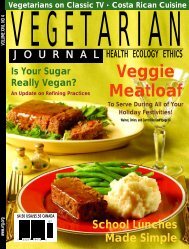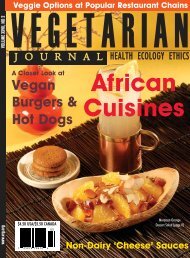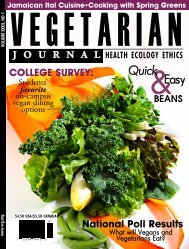Using Dried Fruit - The Vegetarian Resource Group
Using Dried Fruit - The Vegetarian Resource Group
Using Dried Fruit - The Vegetarian Resource Group
You also want an ePaper? Increase the reach of your titles
YUMPU automatically turns print PDFs into web optimized ePapers that Google loves.
no cheese made with microbially-derived rennet canever be 100 percent organic. However, the microbiallyderived rennet can be in an organic product that is95 percent or 70 percent organic because it is on theNational List of Allowed and Prohibited Substancesas an allowed substance that can be used to make orcan serve as ingredients in USDA Certified Organicproducts. (Analogous, USDA Certified Organic sugaron the market today is also “95% Organic” and not“100% Organic” because of the use of a non-organicprocessing aid that is allowable under NOP rules.)LIPASES NOT LABELED AS ANIMAL-DERIVEDConcerned readers should also be aware that someorganic cheeses, like some non-organic cheeses, maycontain other animal-derived enzymes. <strong>The</strong> mostcommon one is lipase, responsible for breaking up fatmolecules. Potter said that lipases are structurally verycomplex compared to rennets. “Fermentation-derivedlipases on the market (today) do not function as wellas animal lipases,” he commented. “This is becauseanimal lipases are a complex blend of lipases. <strong>The</strong>arrangement and ratios needed for optimum functionalityhas not been replicated. <strong>The</strong> result in cheese istoo much of one flavor compound developed and animbalance of flavor during the cheese ripening process.”Thus, most lipases used in cheese today are derivedfrom animals.Most lipases used in cheesetoday are derived fromanimals. <strong>The</strong> animal sourcemay not be listed on the label.Organic Valley, for example, uses microbial rennetand animal-derived lipase in its Romano cheese andBlue Cheese Crumbles. <strong>The</strong> animal source is not listedon the label. Horizon, a major producer of organiccheese, told us by telephone that they use ‘microbial’rennet in all of their cheeses. <strong>The</strong>y did not make anyfurther comment, saying that it was “proprietary information.”Kraft Foods, the major non-organic cheesemanufacturer in North America, told us that theirParmesan and Romano Cheese Blend is made with‘microbial rennet,’ but animal-derived lipase is alsoused to impart the distinctive flavor to Romano cheese.Again, the animal source is not listed on the label.WHAT MAJOR COMPANIES SAYABOUT ANIMAL-DERIVED ENZYMESAccording to the enzyme companies, it appears thatvery little calf rennet (less than 5 percent) is used anymorein the United States. On the other hand, somemajor cheesemakers have said that calf rennet is stillused in several of their cheese varieties. Kraft, by farthe largest cheese company in America, said that, whenthe word ‘enzymes’ by itself appears on a label, consumersshould understand that both animal-derivedand microbial-derived enzymes may have been used.<strong>The</strong>y emphasized that the “box in the store” is thebest place to find out ingredient information for aspecific Kraft product; however, the box often justsays ‘enzymes,’ leaving the consumers in doubt. Krafttold us that when microbial rennet is used, it will belabeled as ‘microbial rennet.’However, on the Kraft website, there is a FAQsheet that explicitly states that Kraft Macaroni &Cheese does contain enzymes derived from animals(calves and sheep), found in the animals’ stomachand intestines. <strong>The</strong> writer was informed by telephonethat this applies to all varieties of Kraft Macaroni &Cheese. A Kraft representative also said that KraftNatural Swiss and Kraft Grated Parmesan utilizemicrobial rennet that is NOT made with enzymesextracted from animal tissue. (This is interestingbecause many other people in the cheese industry toldus that Parmesan cheese is one variety that is oftenmade with calf rennet.) As mentioned previously, theKraft Grated Parmesan Cheese may contain lipase(from an animal source).In addition, <strong>The</strong> VRG asked Sargento, anothermajor cheese manufacturer, about the enzymes usedin their cheeses. <strong>The</strong>y estimated that 11 percent of theircheese brands “possibly contain” animal rennet. (<strong>The</strong>ydid not specify how this percentage was related to theirtotal sales volume.)For updates on ingredients, subscribe to VRG’s e-mail newsletterat . Please note that we depend on company statementsfor product and ingredient information. It is impossibleto be completely sure about a statement, information can change,people have different views, and mistakes can be made. Please useyour own best judgment about whether a product is suitable foryou. To be sure, do further research or confirmation on your own.Jeanne Yacoubou is <strong>The</strong> VRG’s Research Director. She holdsmaster’s degrees in philosophy, chemistry, and educationand wrote “Veggie Options at Quick-Service RestaurantChains” for Issue 2, 2008, of <strong>Vegetarian</strong> Journal.VEGETARIAN JOURNAL Issue Three 2008 13



